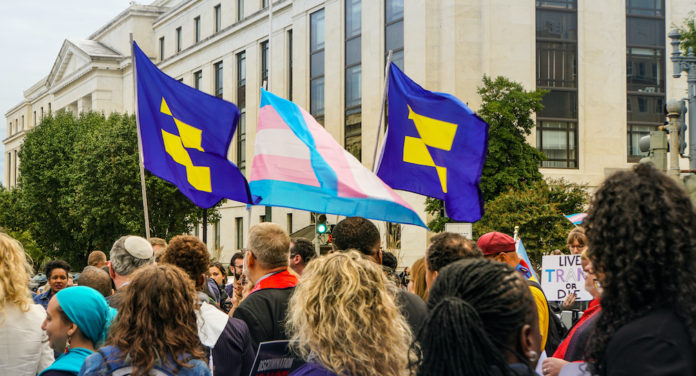[This column appears in the January/February 2022 issue of Boston Spirit magazine.]
Amidst the joy in finally having the Supreme Court affirm federal employment nondiscrimination protections for LGBTQ people in last year’s landmark Bostock v. Clayton County ruling, many people may not have focused on health insurance. But the Bostock decision transformed the rights of transgender people, like our client Alexander Pangborn, who have employer-funded health plans. It has also elevated the profile of continuing discrimination in this area.
Alexander worked as a hospice nurse in western Massachusetts. He received his employee health benefits not through a traditional insurance plan, but instead through a plan that was self-funded by the employer. Unfortunately for Alexander, his employer’s health benefits plan had a complete, categorical exclusion of all gender-affirming medical care. “I put my all into my job and I paid into the same system as all my coworkers to receive medical care,” Alexander said at the time, “but my employer said that my health care wasn’t necessary.”
Alexander’s employer, like many who self-fund their employee health benefits plans—often municipalities and larger companies—operated under an assumption that such exclusions are legal.
GLAD sued Alexander’s employer in federal court. In Massachusetts, and in all New England states, traditional health insurance plans are prohibited from excluding gender-affirming care, often through guidance from State Insurance Commissioners who regulate insurance plans. Employer self-funded health benefits plans, however, are not covered by such regulations. Instead, legal challenges to exclusions in employer self-funded plans are brought under state employment discrimination laws. But there is a federal law that precludes the use of state laws challenging discrimination in employer self-funded benefit plans unless that state law is consistent with the analogous federal law—in this case Title VII which prohibits discrimination in employment on the basis of sex.
When GLAD sued Alexander’s company in early 2020, his employer argued that the sex provisions of Title VII did not cover discrimination on the basis of gender identity or transgender status and therefore Massachusetts gender identity and sex discrimination laws were precluded from governing his case. GLAD argued that there were two decades of near unanimous lower federal court precedent that federal sex discrimination laws prohibit discrimination against transgender people.
We were locked in legal battle for the long run. And then, in June 2020, the Supreme Court handed down its ruling in Bostock, affirming exactly what we were arguing—that the sex discrimination provisions of Title VII do, in fact, prohibit employment discrimination on the basis of sexual orientation and gender identity. The Supreme Court instantaneously removed any doubt about the consistency of Massachusetts and federal law with respect to discrimination against transgender people.
Within days of the Supreme Court’s ruling, Alexander’s employer reversed course, removed the exclusion of gender-affirming care, and folded its hand.
“It’s a huge relief to have this matter finally resolved,” Alexander says now that we have reached a final settlement of all issues in his case. “My hope is that my efforts to challenge my employer’s exclusion, made with GLAD’s assistance and support, will prevent others from experiencing such unfair and harmful denials of healthcare.”
It should. But despite clear protections in law, significant problems remain in both employer-sponsored and traditional insurance plans. We continue to see and hear of plans with categorical exclusions of all treatment. Transgender people also still encounter categorical denials of specific types of treatment such as facial feminization surgery. We still see categorical exclusions of necessary chest reconstruction and other surgeries for minors.
GLAD remains focused on ending all of these exclusions, so that the protections we continue to achieve under the law have a real impact on people’s lives. While we are thrilled to have won the fight for Alexander, we are poised to continue the battle against the many plans that continue to discriminate. No one should ever be denied medically necessary care because of a discriminatory insurance exclusion.
Have you faced insurance exclusions in accessing gender affirming care in New England? GLAD wants to hear from you: contact us at gladanswers.org.









